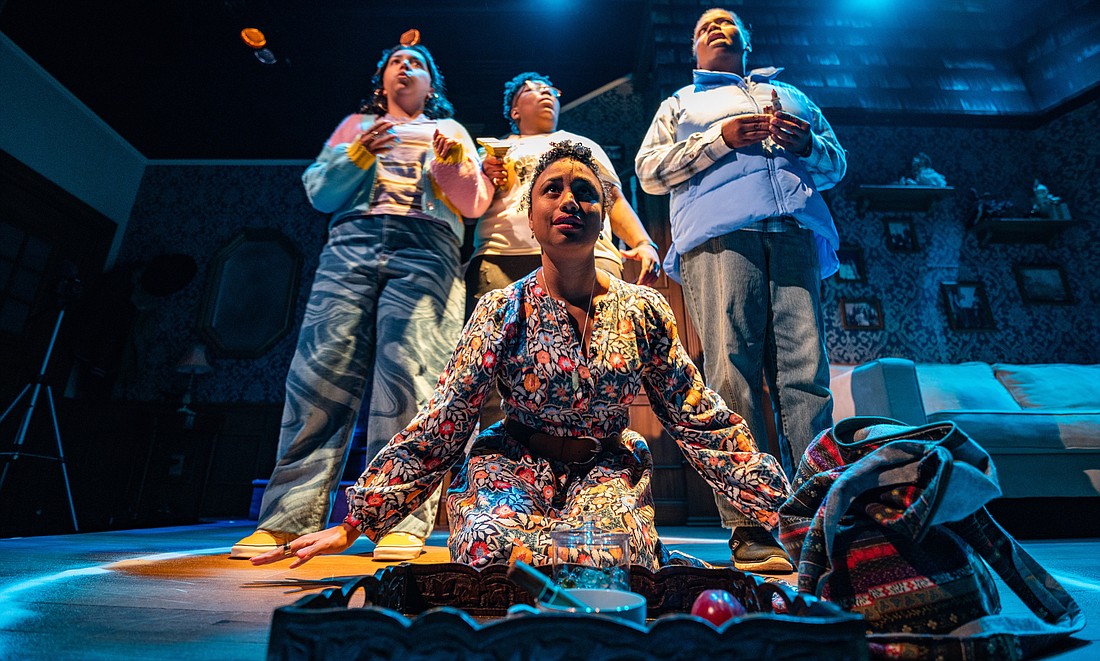- July 26, 2024
-
-
Loading

Loading

“I ain’t afraid of no ghost.”
That’s easy to say, if you don’t believe in ghosts. Do you?
Playwright Rosa Fernandez does.
Her world-premiere play, “A Skeptic and a Bruja,” considers the ethereal implications at Urbanite Theatre.
The play’s core concept is a spin on real-world TV shows like “Ghost Hunters” and “Ghost Nation.”
Fernandez was watching one such program. Then it occurred to her: The “ghost hunters" on these shows never actually come up with clear-cut evidence that ghosts exist. What if they did?
That was the germ of the idea. Two years later, her haunting play is finally on stage.
Priscilla (Lorinda Hawkins Smith) is the new, unhappy owner of a haunted house, though the real estate agent evidently neglected to mention this feature before the closing. Priscilla’s 19th-century house is out in the boondocks — and out of this world.
Along with a room filled with old dolls, this creepy manse also suffers from poltergeist phenomena — mysterious knocks, missing keys, misplaced objects, shimmering lights and framed photos flying off the walls like Frisbees.
Priscilla hopes to turn the place into a bed and breakfast but needs to deal with the spooky shenanigans first. She knows exactly who to call. No, not the Ghostbusters. “A Skeptic and a Bruja.”
In Fernandez’s fictional universe, that’s the name of a ghost-hunting TV show. (They prefer the term “ghost investigators.”)
The team shows up. On this show, they’re all women of color. Sam (Mercedes White) is the skeptic. Jess (Alisha Espinosa) is the “bruja” (a female sorcerer or “woman of knowledge,” as Carlos Castaneda would put it). Remy (Jen Diaz), Jess’ tech-savvy cousin, handles computer and audio/video issues. They quickly confirm (but can’t prove) that Priscilla’s house is haunted. That’s actually a good thing — ghost tourism is huge these days. But these spirits aren’t tourist friendly, and something is very wrong.
The living check into the bed-and-breakfast with their own share of psychic baggage.
Jess is at peace with the dead. But Remy is dealing with her mother’s recent death. (A recovering addict, evidently.) Priscilla mourns the loss of her late partner, Liz. Sam is still guilt-ridden over the death of her beloved grandmother. Apart from Jess, they all think they should’ve called, visited, said something or done something. There’s enough guilt to go around for everybody.
The characters’ personal hauntings feed the house’s malign spirit. The play concludes with a battle royale with this entity.
(Spoiler alert.) Earthly good triumphs over unearthly evil. (It’s unclear whether they got it on video.)
Director Patrice Amon takes a matter-of-fact, naturalistic approach. There’s no brooding tension. Things are normal — until they’re not. The supernatural rattles and rocks the mundane world, then it’s gone. The ghost investigators don’t freak out. To them, the supernatural is, well, natural. They deal with it. That’s their job.
The actors deftly bring their characters to life.
Espinosa’s Jess is a true believer whose psychic abilities are as natural as breathing. She’s uniquely qualified for a dangerous job — and knows the dangers full well. If she’s the Mulder on the team, White’s Sam (the skeptic) is the Scully. She’s good at her job — which boils down to asking blunt questions.
Diaz’s Remy is more fun-loving and down to earth. She’s the roadie on this spooky road show. She keeps the gear running — period. Ghosts aren’t part of her job description.
Smith’s Priscilla is the X-factor. She’s endured a recent trauma. It’s hard to tell (at first) if the spirits might be all in her mind.
This is a haunted house play, after all. But don’t expect the Haunted Mansion.
Jeff Weber’s set is more shabby than scary. Carmen Amon’s costumes are what you’d expect the characters to wear. Joseph Oshry’s lighting design and the Ragan Brothers sound design stay ordinary — until things get weird.
The Urbanite creative team supplies the fear factor as needed, without elbowing you in the ribs. Kudos.
“A Skeptic and a Bruja” is scary — not “Poltergeist” or “The Shining” scary, but scary enough. The play is mostly a comedy, and a funny one at that. On a serious level, Fernandez celebrates female solidarity. The evil spirit is finally defeated when the women join forces. The playwright also spoofs the commodification of the supernatural, but shies away from deeply examining this issue. Ultimately, the heart of her play is philosophical.
In Western civilization, life and death seems like the ultimate binary equation. Most atheists, agnostics and monotheistic believers would agree. When you’re dead, you’re dead. Who could argue with that?
The playwright, evidently. And many indigenous belief systems including Palo and Espiritismo.
Fernandez’s character, Jess, grew up in those traditions. For her, it was the family business.
She notes that “in our culture. Ghosts are not … ghosts. They’re ancestors.”
In this worldview, the border between life and death is thin and permeable.
As seen in Mexico’s Dia de los Muertos, ghosts are your extended friends and family. Most, anyway. Some ghosts are friendly, some are jerks. Just like people.
Fernandez puts this worldview on stage.
It’s not a gimmick for shock value. It’s the way she sees the world. And a viewpoint that millions share.
At least in this world.